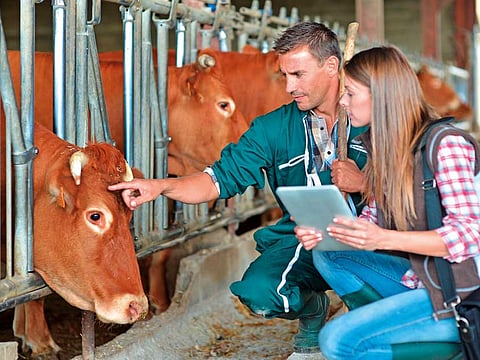Build a rewarding career in vet medicine
Working with animals has many benefits and it can pay you well as well. Innovation and cutting-edge tech now open up new opportunities for professionals

The modern vet is equally at home with wearables and big data, as with traditional pills and injections.
According to the June 2018 analysis by Grand View Research titled Animal Health Market Size, Share & Trends Analysis Report, technological advancements in veterinary healthcare are expected to trigger ample growth opportunities including the “advent of efficient information management systems, animal owner mobile technology, and vaccine banks”.
Overall, the global animal health market was valued at $42.2 billion (Dh155 billion) in 2017, and is expected to grow at a healthy CAGR of 5.5 per cent from 2018-2025.
And as per Market Data Forecast, the veterinary healthcare market in the Middle East and Africa is expected to post an even more impressive CAGR of 6.8 per cent, expanding from $3.15 billion in 2018 to an estimated $4.37 billion by 2023. The UAE and Saudi Arabia are expected to drive most of the growth in this region.
This increasing interest is also spiking demand for veterinary medicine degrees in the UAE, with a range of study options and lucrative career opportunities where innovation and cutting-edge tech will play a key role.
The wheels were set in motion in 2013, when the College of Food and Agriculture of the UAE University (UAEU) introduced a first-of-its-kind bachelors programme in veterinary medicine.
The goal was to “promote, improve, and meet the veterinary, animal and public health needs of the United Arab Emirates”.
Future vets can also apply for the Sheikh Hamdan Bin Mohammed Scholarship for Veterinary Medicine, announced in December 2015 during the Dubai Equine Hospital’s (DEH) 20th anniversary celebrations.
This scholarship gives Emirati high school graduates the opportunity to study veterinary medicine at a top-ranking university and, in turn, further advance the veterinary profession in the UAE, turning it into “a leading profession in the Middle East and internationally”.
Away from the UAE, the impressive list of options where students can enrol include the UCD School of Veterinary Medicine in Dublin, the School of Veterinary Medicine at the University of Glasgow, the Royal Veterinary College at the University of London, the Royal (Dick) School of Veterinary Studies at the University of Edinburgh and the University of Nottingham.
And as the education guide, Edarabia, observes, graduating veterinarians can choose from over 40 speciality areas, ranging from microbiology and dentistry to animal welfare and rehabilitation.
Career prospects range from setting up a private practise — apparently, 80 per cent of vets have their own clinic — to research at various labs, universities and government agencies. Diagnostic laboratories are also in demand, where the focus is on analysing tissues or blood to give accurate diagnosis.
Besides, a veterinarian can teach in universities, agricultural colleges and vet schools, or write for niche magazines and journals. Not to mention being able to slice and dice big data, leverage AI and IoT, or play with the latest in vet tech.
Sign up for the Daily Briefing
Get the latest news and updates straight to your inbox



